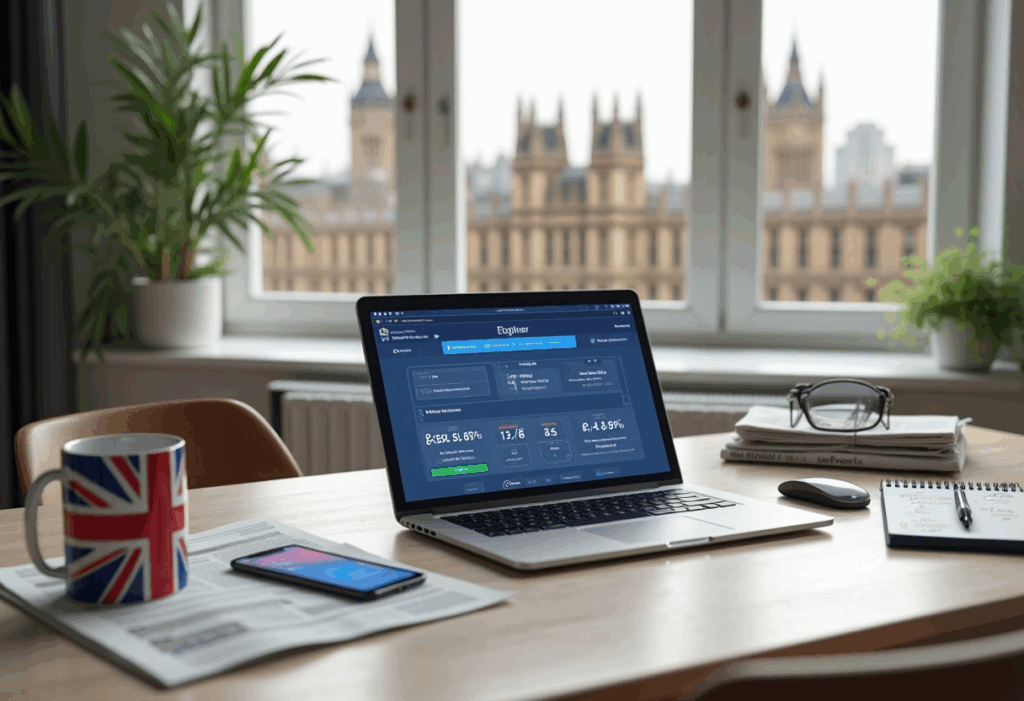The Ultimate Guide to UK Political Betting in 2025
Embarking on the journey of political betting in the United Kingdom presents a unique fusion of political insight and strategic wagering, offering an opportunity to predict outcomes from general elections to party leadership contests. Analogous to sports betting, participants forecast political events, with the potential for financial returns based on the accuracy of their predictions. This comprehensive guide aims to demystify the intricacies of political betting, providing clarity on current odds as of May 7, 2025, explaining the mechanics of placing bets, and addressing common queries for newcomers to ensure a seamless and engaging experience in this dynamic domain.
Best Bookies in UK [December, 2025]

Chanze
- Slots package 650% up to €6.500
- Sports package 250% up to €5.000
- Weekly offers: Claim your bonus and increase your winnings!

GreatSlots
- Plus 10% Weekly Cashback on All Slots!
- 1.000s of the best slots
- VPN Friendly & 2 min registration

Albion
- Level up to claim all prizes up to £30.000
- Cashback up to 45% and rakeback up to 25%
- Access to unique bonuses and exciting activities
Understanding the Basics of Political Betting
Political betting lets you place money on the outcomes of political events. You might bet on which party will secure the most seats in the next UK general election, when that election will happen, or who will become the next leader of a party like the Conservatives. Bookmakers offer “odds” for each outcome, which show how likely they think it is and how much you could win if your prediction is correct.
For example, odds like 13/8 mean that for every £8 you bet, you could win £13 in profit, plus get your £8 back, totaling £21 if you’re right. Higher odds, like 50/1, suggest an outcome is less likely but offer a bigger payout, while lower odds, like 4/5, indicate a higher chance but a smaller reward. If you’re wondering whether political betting is legal, rest assured it’s fully permitted in the UK for anyone over 18, as long as you use a bookmaker licensed by the UK Gambling Commission, which ensures safety and fairness.
You don’t need to be a political expert to start betting, but a basic understanding of UK politics helps. If you’re concerned about risks, know that betting always involves the chance of losing money, so only wager what you can afford to lose and treat it as fun, not a way to make a living. You can place bets online through licensed betting websites or apps, and reputable platforms will display their UK Gambling Commission license to confirm they’re trustworthy.

Navigating the UK Political Landscape
To make smarter bets, it’s helpful to grasp the basics of UK politics. The UK is a parliamentary democracy where citizens vote in general elections to choose Members of Parliament (MPs), who represent local areas called constituencies. The party with the most MPs, or “seats,” typically forms the government, and its leader becomes the Prime Minister. If you’re wondering what “most seats” means in betting, it’s simply predicting which party will have the most MPs after an election.
Key Political Parties and Leaders in 2025
Here’s a quick look at the key players:
- Labour Party: In power since winning the 2024 general election, led by Prime Minister Keir Starmer. Labour focuses on social equality and public services like healthcare.
- Conservative Party: Governed from 2010 to 2024 but lost in 2024. Now led by Kemi Badenoch, who succeeded Rishi Sunak, the party emphasizes economic conservatism and traditional values.
- Reform UK: A newer, right-wing party gaining traction, led by Nigel Farage, known for its anti-establishment views.
- Liberal Democrats: A centrist party advocating for social fairness and environmental policies, currently with fewer MPs.
- Other Parties: Smaller groups like the Green Party or Scottish National Party (SNP) have less national impact but may appear in some betting markets.
Recent Political Context
The 2024 general election was a turning point, with Labour ending 14 years of Conservative rule. The next election must happen by August 2029, but the Prime Minister can call one earlier, which is why betting on the election’s year is popular. If you’re curious why UK elections don’t have fixed dates, it’s because the system allows flexibility, unlike countries with set schedules. Current dynamics show Labour leading in polls, Reform UK rising, and the Conservatives rebuilding under new leadership.
If you’re asking how political events affect betting odds, it’s all about news and public sentiment. For instance, if a party surges in polls or a leader faces a scandal, odds can shift quickly. A strong poll for Labour might shorten their odds from 2/1 to 13/8, meaning they’re seen as more likely to win.
Current Political Betting Odds
Below are the latest odds for key political betting markets as of 7 May 2025, based on the best offers from bookmakers. Odds are shown as fractions, and we’ve included examples of what a £10 bet would pay out to make it clear. If you’re wondering what odds mean, lower ones (e.g., 7/4) suggest a higher chance but smaller winnings, while higher ones (e.g., 50/1) indicate a long shot with a bigger potential reward.

Next General Election – Party with Most Seats
This is the most popular betting market, as it predicts which party will win the most MPs in the next general election, likely determining the next government.
| Party | Odds | Payout for £10 Bet |
| Labour | 13/8 | £16.25 profit + £10 stake = £26.25 |
| Reform UK | 7/4 | £17.50 profit + £10 stake = £27.50 |
| Conservatives | 10/3 | £33.33 profit + £10 stake = £43.33 |
| Liberal Democrats | 50/1 | £500 profit + £10 stake = £510 |
Reform UK is slightly favoured, reflecting their growing support, but Labour’s recent victory keeps them close. The Liberal Democrats, with fewer MPs historically, are seen as unlikely to lead, which is why their odds are high at 50/1. If you’re wondering why smaller parties like the Greens aren’t listed, they often have even higher odds (e.g., 150/1) and appear in less prominent markets due to their slim chances.
Year of the Next General Election
Since UK election dates aren’t fixed, betting on when the next one will occur is a speculative and engaging market. If you’re curious why this is a betting option, it’s because the Prime Minister’s ability to call an early election adds uncertainty.
| Year | Odds | Payout for £10 Bet |
| 2029 or later | 4/5 | £8 profit + £10 stake = £18 |
| 2028 | 7/4 | £17.50 profit + £10 stake = £27.50 |
| 2027 | 12/1 | £120 profit + £10 stake = £130 |
| 2025 | 16/1 | £160 profit + £10 stake = £170 |
The odds point to 2029 or later as the most likely, matching the typical five-year gap after 2024. An election in 202 2025 is seen as unlikely, as governments rarely call elections so soon after the last one. If you’re wondering what might trigger an early election, possibilities include a government collapse, a no-confidence vote in Parliament, or a Prime Minister’s strategic decision to capitalize on strong polls.
Next Conservative Party Leader
The Conservatives recently chose Kemi Badenoch to replace Rishi Sunak, but this market predicts who might succeed her. If you’re asking why this market exists when a new leader was just picked, it’s because party leaders can face pressure to resign if they lose support, keeping the market active.
| Candidate | Odds | Payout for £10 Bet |
| Robert Jenrick | 11/4 | £27.50 profit + £10 stake = £37.50 |
| James Cleverly | 9/2 | £45 profit + £10 stake = £55 |
| Boris Johnson | 10/1 | £100 profit + £10 stake = £110 |
| Nigel Farage | 12/1 | £120 profit + £10 stake = £130 |
Robert Jenrick, a senior MP, is the favourite, but some bettors speculate on a return by former Prime Minister Boris Johnson or Nigel Farage, leader of Reform UK, possibly joining the Conservatives. If you’re curious who these candidates are:
- Robert Jenrick: A prominent Conservative MP with strong party backing.
- James Cleverly: Another key MP, known for past government roles.
- Boris Johnson: Former Prime Minister, popular but polarizing.
- Nigel Farage: Not currently a Conservative, but a high-profile figure.
Odds shift based on candidates’ actions, media coverage, or party performance, so if Jenrick gains traction, his odds might shorten.

Other Notable Betting Markets
Political betting offers a variety of markets to suit different interests. If you’re wondering why there are so many options, it’s because politics is unpredictable, and bookmakers create diverse markets to keep things exciting. Other markets include:
- Next Liberal Democrat Leader: Betting on who might replace their current leader.
- Next Labour Party Leader: Predicting Keir Starmer’s successor.
- First Party Leader to Be Replaced: Wagering on which leader (e.g., Starmer, Badenoch) leaves first.
- Keir Starmer’s Departure Date: Guessing when the Prime Minister will step down.
- Will Kemi Badenoch Lead Conservatives into the Next Election?: Betting on whether she’ll stay leader.
- Kemi Badenoch’s Departure Date: Predicting her tenure’s length.
For beginners, the “Party with Most Seats” market is a great starting point, as it’s tied to a major event and easier and more engaging to follow than leadership or timing bets. If you’re interested in local elections or by-elections, some bookmakers offer these, but they’re trickier to predict.
Getting Started with Political Betting
If you’re ready to try political betting, here are practical tips to begin:
- Start Small: Bet small amounts, like £5 or £10, to learn the ropes without risking much.
- Stay Informed: Follow political news through outlets like BBC, The Guardian, or TV debates to spot trends that might affect odds.
- Check Odds Regularly: Odds change with new developments, so visit betting sites often to find the best value.
- Compare Bookmakers: Different platforms may offer slightly different odds for the same market, so shop around.
- Set a Budget: Decide how much you’re comfortable spending and stick to it, avoiding the temptation to chase losses.
- Learn the Lingo: Get familiar with terms like “stake” (your bet amount), “odds” (payout ratio), and “market” (the event you’re betting on).
If you’re wondering about practical details:
- You can bet on your phone via apps or mobile-friendly websites, making it convenient.
- Winnings go to your betting account, and you can withdraw to a bank account, card, or services like PayPal.
- Betting winnings are tax-free in the UK, so you keep everything.
- If you lose, you forfeit your stake, which is why budgeting is key.
- Bets are usually final, but some platforms offer “cash out” to settle early for a partial return.
Betting Responsibly

Political betting should be fun, not stressful. To keep it enjoyable:
- Treat It as a Hobby: The odds favour bookmakers over time, so view betting as entertainment, not income.
- Know Your Limits: If betting feels overwhelming, take a break. Most platforms offer deposit limits or self-exclusion tools.
- Seek Support if Needed: If you’re worried about betting habits, contact GamCare (www.gamcare.org.uk) for free, confidential help.
If you’re concerned about overspending, set a monthly budget and use platform tools to enforce it. For age restrictions, you must be 18 or older, and bookmakers verify this during signup.
Conclusion
Political betting in the UK blends the thrill of prediction with the drama of politics, offering markets on everything from the next election’s winner to party leadership changes. Whether you’re betting on Labour’s chances, the year of the next election, or a new Conservative leader, there’s a market to spark your interest. As a beginner, start with simple bets, stay updated on political news, and always wager responsibly. By checking odds regularly and approaching betting with curiosity and caution, you can dive into this unique world while deepening your understanding of UK politics. Happy betting, and may your predictions be spot on!

